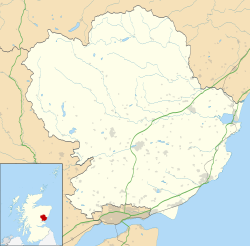This article includes a list of general references, but it lacks sufficient corresponding inline citations .(September 2016) |
| Craigowl Hill | |
|---|---|
 Road leading to masts on Craigowl Hill | |
| Highest point | |
| Elevation | 455 m (1,493 ft) |
| Prominence | 393 m (1,289 ft) |
| Parent peak | Lochnagar |
| Listing | Marilyn, Hardy |
| Geography | |
| Location | Sidlaw Hills, Scotland |
| OS grid | NO376400 |
| Topo map | OS Landranger 53 |
Craigowl Hill is a summit towards the eastern end of the Sidlaw Hills in Angus, Scotland. Northeast of Kirkton of Auchterhouse and approximately eight kilometres north of Dundee, Craigowl Hill represents the highest point in the range. It also known for being one of the hardest cycling climbs in Scotland, as a 3.36-kilometre (2 mi 155 yd) climb at 9.4% gradient.

